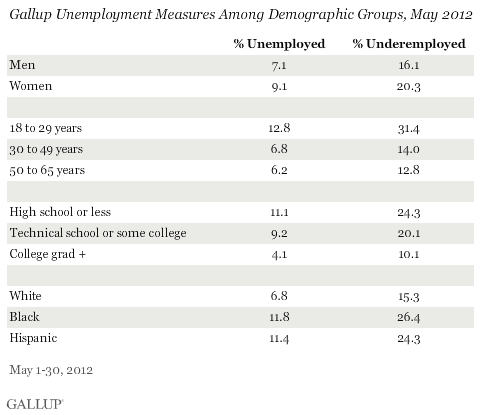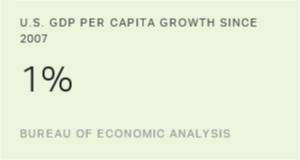WASHINGTON, D.C. -- U.S. unemployment, as measured by Gallup without seasonal adjustment, dropped to 8.0% in May, a new low since Gallup began measuring employment in 2010, and more than a full percentage-point decline from May 2011. Gallup's seasonally adjusted number for May is 8.3%, down from 8.6% in April. However, that remains higher than the seasonally adjusted low of 7.9% recorded in January 2012.
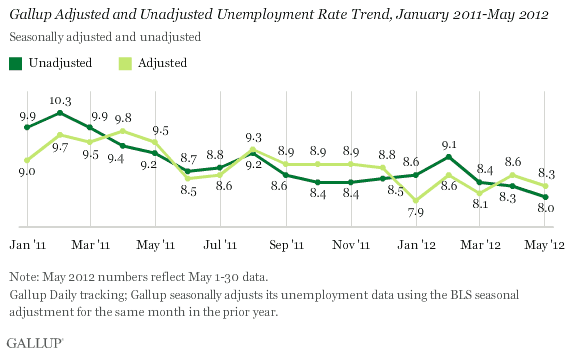
These results are based on Gallup Daily tracking interviews, conducted by landline and cell phone, with almost 30,000 Americans throughout the month. Gallup calculates a seasonally adjusted unemployment rate by applying the adjustment factor the government used for the same month in the previous year.
U.S. underemployment, as measured without seasonal adjustment, declined to 18.0%, a slight improvement over last month. Gallup's U.S. underemployment measure combines the unemployed with those working part time but looking for full-time work. Gallup does not apply a seasonal adjustment to underemployment.
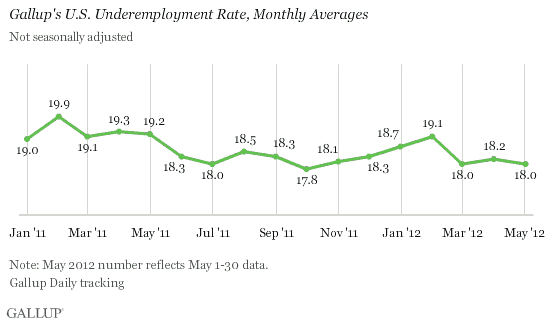
The decline in underemployment is exclusively the result of the decline in the unemployment component of the measure. The number of people working part time but wanting full-time work is essentially unchanged from April 2012 and is unchanged from a year ago. Although more people are finding work, the number of people struggling to find enough hours has persisted in a narrow range between 9% and about 10% since January 2011.
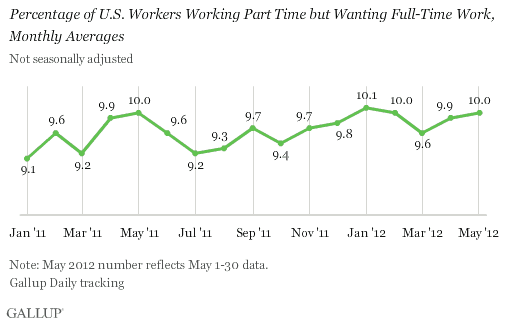
Underemployed Workers Are More Hopeful
Forty-seven percent of underemployed workers in the U.S. are hopeful they will find a job or a full-time job in the next four weeks, a marked improvement from the 39% in January. Unemployed workers are significantly more likely to be hopeful about finding a job (54%) than part-timers who want full-time work are about finding a new job (41%), though hope has improved among both groups since January.
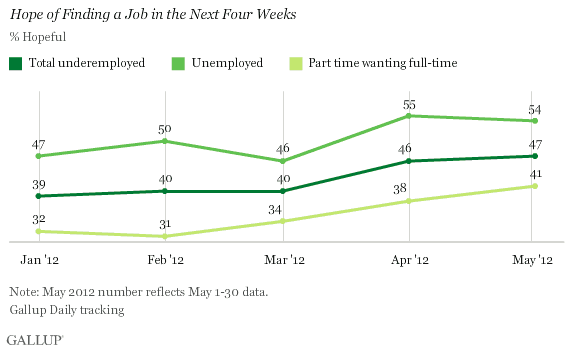
Young Adults, Those With Lower Education Levels, Women Face Higher Unemployment
Young adults, minorities, people with a high school education or less, and women continue to face higher levels of unemployment and underemployment. Young adults are particularly plagued by underemployment, with one out of every three Americans aged 18 to 29 in the workforce currently underemployed. Unemployment and underemployment are significantly higher for Hispanics and blacks than for whites. While the employment situation has improved modestly since May of last year for all demographic groups, the disparities between groups are unchanged. The May 2012 demographic data for these groups can be found on page 2.
Implications
Despite recent drops in unemployment reported by Gallup and the U.S. Bureau of Labor Statistics, the U.S. employment situation remains fragile. Although Gallup's unadjusted number is at a new two-year low, the adjusted number remains higher than January's number, suggesting that the recent declines reported by the BLS may not continue. Further, many demographic groups, including young adults and minorities, continue to be burdened by unemployment rates that are significantly higher than the national average. Substantial improvements will need to be made before these groups feel relief.
Still, the situation is better than it was a year ago, and underemployed workers in the U.S. seem to sense positive momentum and are more optimistic about finding work than they were at the beginning of the year.
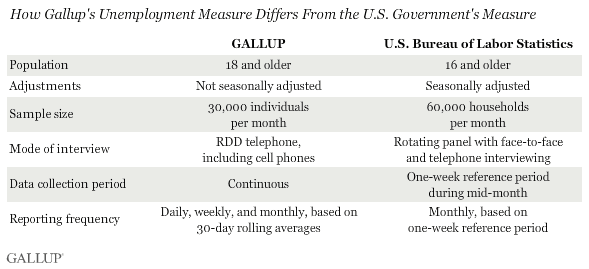
Gallup.com reports results from these indexes in daily, weekly, and monthly averages and in Gallup.com stories. Complete trend data are always available to view and export in the following charts:
Daily: Employment, Economic Confidence, Job Creation, Consumer Spending
Weekly: Employment, Economic Confidence, Job Creation, Consumer Spending
Read more about Gallup's economic measures.
View our economic release schedule.
Survey Methods
Results are based on telephone interviews conducted as part of Gallup Daily tracking from May 1-30, 2012, with a random sample of 29,243 adults, aged 18 and older, living in all 50 U.S. states and the District of Columbia, selected using random-digit-dial sampling.
For results based on the total sample of national adults, one can say with 95% confidence that the maximum margin of sampling error is ±1 percentage point.
Interviews are conducted with respondents on landline telephones and cellular phones, with interviews conducted in Spanish for respondents who are primarily Spanish-speaking. Each sample includes a minimum quota of 400 cell phone respondents and 600 landline respondents per 1,000 national adults, with additional minimum quotas among landline respondents by region. Landline telephone numbers are chosen at random among listed telephone numbers. Cell phone numbers are selected using random-digit-dial methods. Landline respondents are chosen at random within each household on the basis of which member had the most recent birthday.
Samples are weighted by gender, age, race, Hispanic ethnicity, education, region, adults in the household, and phone status (cell phone only/landline only/both, cell phone mostly, and having an unlisted landline number). Demographic weighting targets are based on the March 2011 Current Population Survey figures for the aged 18 and older non-institutionalized population living in U.S. telephone households. All reported margins of sampling error include the computed design effects for weighting and sample design.
In addition to sampling error, question wording and practical difficulties in conducting surveys can introduce error or bias into the findings of public opinion polls.
For more details on Gallup's polling methodology, visit www.gallup.com.
